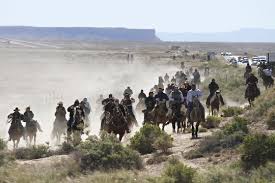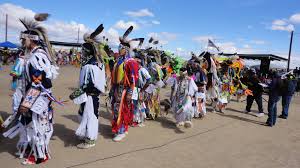mckinley & san juan counties;
bernalillo, cibola, rio arriba, sandoval & socorro counties, NM
In New Mexico, the eastern portion of the Navajo Nation primarily occupies San Juan and McKinley counties, with contiguous and non-contiguous communities spreading also to surrounding Rio Arriba, Sandoval, Bernalillo and Cibola counties, and Socorro county to the southeast.
For New Mexico Medicaid COVID-19 Information, click HERE.
new mexico public health & income support offices
SERVING THE NAVAJO NATION
While none of New Mexico's county-based public health and income support offices are located on the Navajo Nation, each office does serve Navajo Nation communities located within their counties. The public health offices are a primary way in which the State supports the health of all New Mexicans including special supplemental nutrition, immunizations, and Children's Medical Services case coordination and pediatric specialty clinics. Each office has its own unique set of services, some may accept walk-ins, and some may require an appointment. The Income Support Division offices provide information on diverse public benefits including Medicaid. Navajo Nation: The San Juan County ISD makes monthly visits to Newcomb and Shiprock chapters. Children's Medical Services is presently engaged in outreach to rural San Juan/McKinley County Navajo Nation communities in partnership with Navajo Family Voices.
Healthcare Resource Directories
|
CMS Resource List
|
Children's Medical Services has been compiling a resource list of directories, curriculums, programs, videos, and other information for children and youth with special health care needs.
|
|
NM Medical Home Portal
|
Partnered with other states, the portal provides a one-stop-shop for information related to supporting children and youth with special health care needs (CYSHCN) and their families including a NM Medical Home Portal Services Directory of service providers.
|
Supplemental Nutrition Assistance Program (SNAP)
New Mexico Supplemental Nutrition Assistance Program (SNAP) benefits are determined by a household size and net income amount. Anyone may apply online or by phone at 1-800-283-4465. To apply online please click here.
NM Medicaid Options for Tribal Members
Native American Medicaid recipients in New Mexico may enroll in Medicaid Managed Care, or may continue to rely solely on Indian Health Services (IHS). The Managed Care Organization (MCO) in New Mexico is the Medicaid Centennial Care Program. The state department in charge is the New Mexico Human Services Department.
Click here for detailed information on Centennial Care options for Native Americans.
You can choose a MCO on-line, or contact the Consolidated Customer Service Center by phone at: 800-283-4465. To reach the Native American Liaison please click here.
Apply online at YesNM or in person through your local Income Support Division (ISD) office, (which has an office off-reservation in each county). Please call ISD San Juan County office at (505) 566-9600 for dates and times.
Click here for detailed information on Centennial Care options for Native Americans.
You can choose a MCO on-line, or contact the Consolidated Customer Service Center by phone at: 800-283-4465. To reach the Native American Liaison please click here.
Apply online at YesNM or in person through your local Income Support Division (ISD) office, (which has an office off-reservation in each county). Please call ISD San Juan County office at (505) 566-9600 for dates and times.
1. Centennial Care - IHS Fee for Service Medicaid
Native Americans may stay in Fee-for-Service Medicaid (depending on current Medicaid services) or choose a MCO with Centennial Care. Fee-for-service simply means you are not part of, and do not benefit from, Centennial Care managed care health planning. No matter which choice you make, tribal members can still go to IHS and tribal clinics and hospitals for healthcare service. Centennial Care works hand in hand with IHS and Tribal Health Clinics to provide access to medical services. Most Native Americans currently on Medicaid are not required to be in Centennial Care, but can choose to be in a MCO.
No matter what, it is important to enroll in Medicaid even if you continue to use Indian Health Service (IHS), because your Medicaid enrollment adds funds to IHS. IHS is reimbursed by Medicaid when it treats Medicaid recipients. Medicaid recipients also have access to quicker and more diverse care resources than relying solely on IHS, which has very limited funds and medical staff. Medicaid also covers transportation to long-distance medical appointments.
2. Centennial Care Medicaid Managed Care Organization (MCO)
Native Americans may stay in Fee-for-Service Medicaid (depending on current Medicaid services) or choose a MCO with Centennial Care. Fee-for-service simply means you are not part of, and do not benefit from, Centennial Care managed care health planning. No matter which choice you make, tribal members can still go to IHS and tribal clinics and hospitals for healthcare service. Centennial Care works hand in hand with IHS and Tribal Health Clinics to provide access to medical services. Most Native Americans currently on Medicaid are not required to be in Centennial Care, but can choose to be in a MCO.
No matter what, it is important to enroll in Medicaid even if you continue to use Indian Health Service (IHS), because your Medicaid enrollment adds funds to IHS. IHS is reimbursed by Medicaid when it treats Medicaid recipients. Medicaid recipients also have access to quicker and more diverse care resources than relying solely on IHS, which has very limited funds and medical staff. Medicaid also covers transportation to long-distance medical appointments.
2. Centennial Care Medicaid Managed Care Organization (MCO)
Medicaid managed care called Centennial Care provides managed care health planning, The vision is that a single MCO can help you get all the care you need. Tribal members who do not need long-term care services are not required to choose an MCO and will not be assigned to an MCO. For more information, click here.
Begun in 2014, New Mexico Centennial Care combines Salud, New Mexikids (CHIP), CoLTS and Optum and other programs into services through a single health plan-based Medicaid program provided by a managed care organization (MCOs). The MCOs promote more integrated care, properly case manage the most at-risk members, involve members in their own wellness, and pay providers for outcomes. Services include physical health, behavioral health, long-term care and community benefits. Community Benefits include adult day health, respite care, and personal care services, including assistance with daily tasks such as hygiene, meals, and mobility. The program supports both Agency-Based Community Benefit (ABCB) care and Self-Directed Community Benefit (SDCB) care. Frequently, the MCO will have a Care Coordinator to help you understand and make healthcare decisions and obtain resources, including referrals or prior authorizations and also assist you with transportation to medical appointments. You can also earn cash "Centennial Rewards" for participating and meeting health targets. NOTE: Native Americans are exempt from co-pays under Centennial Care.
MCOs offering Centennial Care health plans are:
Begun in 2014, New Mexico Centennial Care combines Salud, New Mexikids (CHIP), CoLTS and Optum and other programs into services through a single health plan-based Medicaid program provided by a managed care organization (MCOs). The MCOs promote more integrated care, properly case manage the most at-risk members, involve members in their own wellness, and pay providers for outcomes. Services include physical health, behavioral health, long-term care and community benefits. Community Benefits include adult day health, respite care, and personal care services, including assistance with daily tasks such as hygiene, meals, and mobility. The program supports both Agency-Based Community Benefit (ABCB) care and Self-Directed Community Benefit (SDCB) care. Frequently, the MCO will have a Care Coordinator to help you understand and make healthcare decisions and obtain resources, including referrals or prior authorizations and also assist you with transportation to medical appointments. You can also earn cash "Centennial Rewards" for participating and meeting health targets. NOTE: Native Americans are exempt from co-pays under Centennial Care.
MCOs offering Centennial Care health plans are:
Early Intervention, Medical/Surgical Help & Therapy
(NM Medicaid-Presbyterian Health Plan)
(NM Medicaid-Presbyterian Health Plan)
Roundtree Children's Developmental Services, founded in 2010, is a program of Presbyterian Medical Service in NMDOH's family, infant and toddler program for newborns to age 3. Located in Farmington, Roundtree will travel to reservation communities. Its services are free and include case management, occupational therapy, physical therapy, speech therapy, behavioral health, outreach to NM School for the Blind and Visually Impaired, NM School for the Deaf, and the Medically Fragile Program as well as Head Start, Early Head Start, Pre-K, and Parent Education / Home Visiting. Eligibility: Enrollment in Medicaid's Presbyterian Centennial Care health plan. Navajo Nation: Roundtree will travel to reservation communities in New Mexico. Their case managers will arrange for transportation to therapy appointments and provide transition services to Central Consolidated School District (CCSD) public schools, which pick up occupational and speech therapy beyond age 3.
Nutrition for Pregnancy to Age 3 (WIC)
The Special Supplemental Nutrition Program for Women, Infants, and Children (WIC) provides supplemental foods including infant formula, health care referrals, and nutrition education for low-income pregnant, breastfeeding, and non-breastfeeding postpartum women, and to infants and children up to age 5 who are found to be at nutritional risk. You must be individually determined to be at "nutritional risk" by a health professional and financially quality as low-income. Navajo Nation Region: Navajo Nation WIC: The Navajo Nation Dept. of Health directly runs an Indian Tribal Organization (ITO) administered Navajo WIC Nutrition Program which is independent of state WICs. Navajo Nation WIC has established its own residency requirements with service units that cut across state lines.
Pediatric Specialty Clinics & Chronic Health Coordinated Care (CMS)
Children's Medical Services (CMS), a program within the Family Health Bureau of NMDOH offers free "care coordination," multi-disciplinary pediatric specialty clinics, limited medical coverage, information and referral for covered conditions. "Care coordination" means CMS social workers assist clients to coordinate health, medical and other community resources as they develop and meet child and family goals. Families participate as partners in decision-making regarding their children’s medical care and other services. Services are coordinated in partnership with the local primary care provider / medical home. Please call CMS as soon as there is a birth defect diagnosis. Please find CMS at the Public Health Office in your county. Eligibility: Medicaid / Centennial Care. CMS may provide help for those financially eligible but have no health coverage.
programs that support developmentally disabled
and medically fragile to live at home
New Mexico has several public assistance Home and Community Based Medicaid (HCBM) Waiver programs that will help those with disabilities to live in our homes and communities. They are called "waiver" programs because you are opting out of, or "waiving," your right to institutional care. You must be a resident of New Mexico to qualify for all these programs, which are administered directly by the State. Wait lists are very long, often a number of years. Interim services through other programs may be obtained while your waiver applications are pending.
Medicaid Waiver Program for Developmental Disabilities (DD Waiver)
|
What is Provided
|
An array of residential, in home, community, employment, therapeutic and family support services for children and adults, intended to add to, not replace, other supports.
|
|
Eligibility
|
Adults, age 18 years or older, are eligible for all DD Waiver services based on income and assessed need clinical justification. Children under age 18 may qualify for children's category services. Only individual income, not household or parents' income, is considered.
|
|
Funding Source
|
Since 1981, state general funds matched with federal funds from the Centers for Medicare and Medicaid Services under Title XIX.
|
|
How to Apply
|
You must first register with your regional NM DOH Development Disabilities Support Division office. For the northwest region, the DDSD office is at 2910 East Route 66, Gallup, NM 87301; Phone: (505) 863-9937 x107 or 866-862-0448. You may also apply through Income Support Division (ISD) who will forward your application to DDSD.
|
|
Website
|
Development Disabilities Waiver, NM Dept of Health. Please also look at "DD Waiver -- Fitting the Pieces Together."
|
Medically Fragile Waiver (MF Waiver)
|
What is Provided
|
Services that allow you to live in your home, such as case management (by Registered Nurses only), private duty nursing (RN & LPN), home health aides, respite, physical therapy, speech therapy, occupational therapy, behavior support consultation, nutritional counseling and specialized medical equipment and supplies.
|
|
Eligibility
|
There are both medical and income criteria. To be medically eligible, you must have been diagnosed with a medically fragile condition and a developmental disability, or at risk of developmental disability, prior to the age of 22. "Developmental disability" means an intellectual disability or a related condition (such as cerebral palsy, seizure disorder, autism), and a developmental disability or risk for developmental delay. "Medically fragile" means a chronic physical condition which results in a prolonged dependency on medical care for which daily skilled nursing intervention is medically necessary e.g. for bathing, dressing, eating; you might need special equipment to live such as monitors, ventilators or feeding pumps, or special treatments such as dialysis or ongoing oxygen. Only individual income, not household or parents' income, is considered.
|
|
Authority
|
Approved in NM in 1985, and authorized under Section 1915C of the Social Security Act.
|
|
How to Apply
|
Contact your regional NM DOH Development Disabilities Support Division office. You may be able to fill in the registration form over the phone. For the Northwest region, the DDSD office is at 2910 East Route 66, Gallup, NM 87301; Phone: (505) 863-9937 or 866-862-0448. You may also apply through Income Support Division (ISD) who will forward your application to DDSD. The UNM MFW Case Management Program (505) 272-2910 will take your information by phone and mail you a copy of your completed form with a date stamped receipt.
|
|
Website
|
Medically Fragile Waiver, NM Dept. of Health.
|
Mi Via Self-Directed Waiver
|
What is Provided
|
Mi Via is designed for persons and families who want to self-direct services and support provided under the DD Waiver or Medically Fragile Waiver programs. Participants, your families or authorized representatives, working with a program consultant, manage your services, service plan and budgets, establishing your own employees and/or selecting your own vendor agencies to provide services with support from existing systems within the Mi Via program. You monitor your own service budget, and designate a non-paid Employer of Record (EOR), if needed, who is a nonpaid person who assists with the oversight of employee functions, assist with vendors for services, or arrange for training employees or vendors should have, or for keeping records and documents of vendor or employee agreements and program eligibility.
|
|
Eligibility
|
You must already be receiving HCBM Waiver services in order to qualify for Mi Via.
|
|
Authority
|
Since 2014, in accordance with Centers for Medicaid and Medicare Services (CMS) Final Rule for all Home and Community Based-Services (HCBS) settings.
|
|
How to Apply
|
If you are currently being served by the Developmental Disabilities Waiver (DDW) or Medically Fragile Waiver (MFW) programs and you decide you want to participate in Mi Via, you need to fill out a Waiver Change Form (WCF) which you can get from the MF Waiver Program Manager or the regional NM DOH Development Disabilities Support Division office. For the Northwest region, the DDSD office is at 2910 East Route 66, Gallup, NM 87301; Phone: (505) 863-9937 or 866-862-0448. Once the waiver change form is completed, you will be contacted to participate in a transition meeting, enroll with the Financial Management Agency and develop your Mi Via Service and Support Plan and budget. If you are not yet in a waiver program, you must register for services with DDSD.
|
|
Website
|
Mi Via Self-Directed Waiver, NM Dept. of Health.
|
Centennial Care Waiver for Community Benefit (CCW)
|
What is Provided
|
Under Centennial Care "Community Benefits" category, you may receive long-term care resources for disabled and seniors outside of a nursing home facility e.g. adult day care, case management, caregiver support, transportation, respite care, chore services, home-delivered meals, legal services, and health promotion and disease prevention. Services other than assisted living may be through an approved agency, or you may self-direct services similar to Mi Via.
|
|
Eligibility
|
You must require a nursing home level of care and meet Medicaid income and asset limits, or SSI income and resource limits.
|
|
How to Apply
|
You need to be enrolled in a Centennial Care Medicaid health plan. Apply online or in person through your local Income Support Division (ISD) office, (which has an office off-reservation in each county). ISD will also soon be taking applications in Newcomb and Shiprock once a month. Please call ISD San Juan County office at (505) 566-9600 for dates and times.
|
|
Websites
|
Contact a Centennial Care Medicaid Managed Care Organization (MCO) for information or to enroll. Here is an example of a CCW plan -- BlueCross Blueshield of NM;
|




